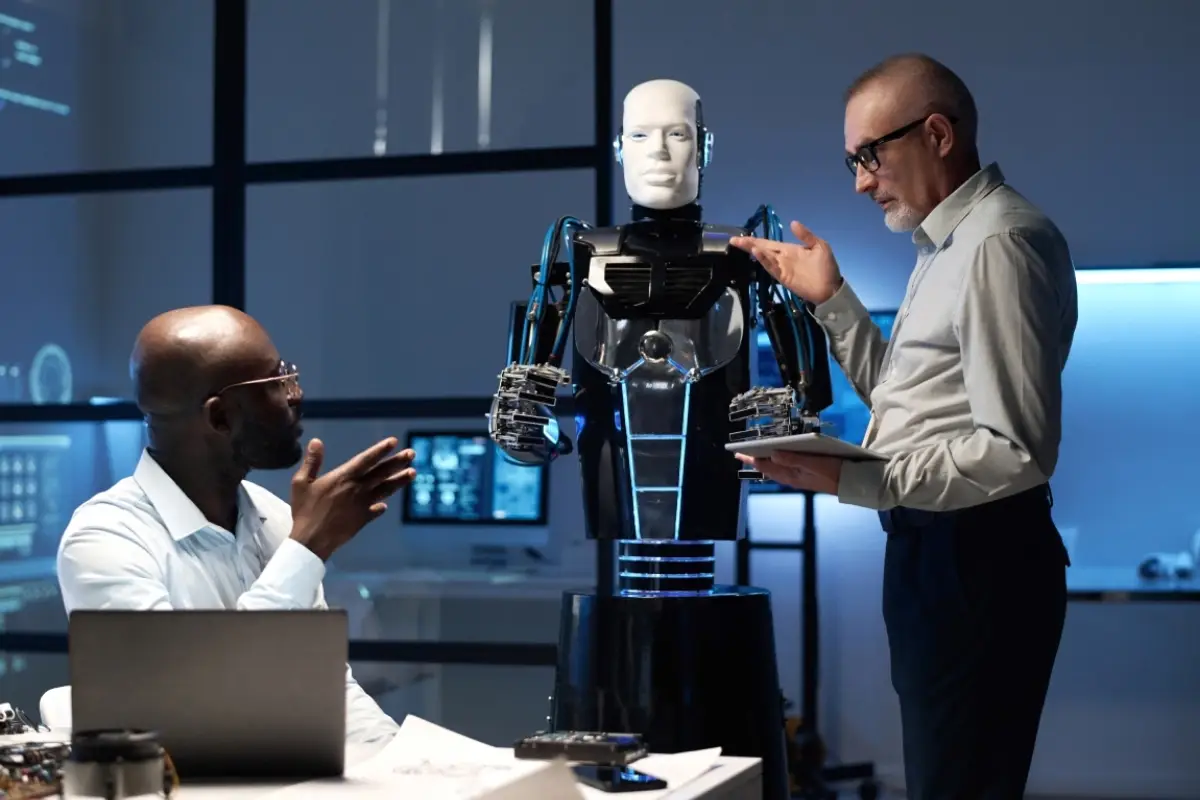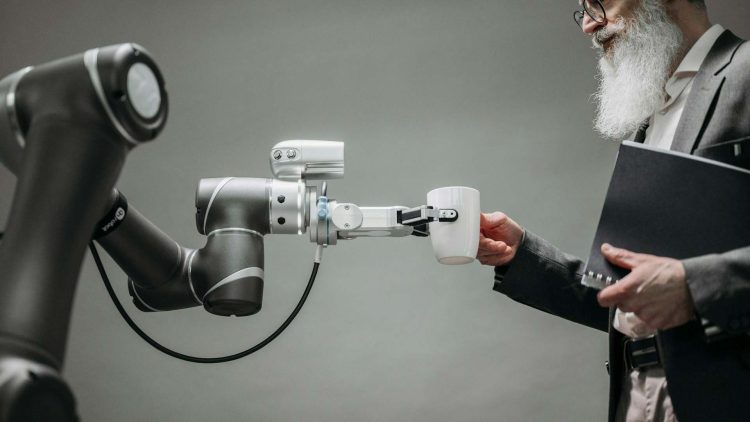Introduction
The rise of artificial intelligence (AI) has ignited one of the most heated debates of the 21st century. As AI technologies continue to evolve, the world stands at a crossroads. Will machines fully replace human workers, or will they redefine the way we work? The question is more complex than a simple binary answer and requires us to examine the various ways in which AI is integrated into industries, societies, and workplaces.
A Brief History of AI in the Workforce
From the early days of automation to the current explosion of AI-driven innovations, the impact of machines on human work has been profound. In the 20th century, the industrial revolution introduced mechanical automation. Today, AI promises to bring about a revolution in industries ranging from healthcare to finance to entertainment. Yet, the core question remains: How will this technological advancement affect jobs, both existing and future?
The Case for Job Replacement
AI systems have made impressive strides in performing tasks that were once the exclusive domain of human labor. Jobs that involve repetitive tasks, data processing, or physical labor are particularly vulnerable to automation.
Automation of Routine Tasks
One of the most immediate concerns is that AI will replace jobs that consist of repetitive and routine tasks. Machines excel at tasks that can be codified into algorithms. For instance, AI is already being used in manufacturing to assemble products, in call centers to handle customer queries, and in logistics to optimize routes for delivery trucks.
Increased Efficiency, Reduced Cost
The efficiency of AI in areas like data entry, content generation, and quality control is unparalleled. Not only can AI work around the clock without fatigue, but it can also analyze vast datasets at lightning speed—something that human workers struggle to achieve. In industries such as finance and marketing, algorithms can now predict market trends and optimize advertising campaigns, reducing the need for large teams of analysts.
The Impact on Low-Skill Workers
Low-skill jobs, particularly in sectors like retail and warehousing, are at the highest risk of being replaced by AI. Autonomous delivery vehicles, robot-assisted warehouses, and AI-powered checkout systems have already begun to shift the landscape. For workers in these industries, the fear of job displacement is real. According to a 2019 report by the Brookings Institution, up to 25% of U.S. jobs are at high risk of automation.
The Case for Job Redefinition
While the fear of job loss is understandable, it’s also important to recognize that AI has the potential to redefine many jobs rather than eliminate them. Instead of replacing humans, AI can augment human capabilities, making jobs more efficient, creative, and meaningful.
Human-AI Collaboration: A New Model for Work

AI can serve as a powerful tool for human workers, enabling them to focus on higher-level tasks while AI handles repetitive or mundane tasks. In the healthcare sector, for instance, AI systems can assist doctors in diagnosing diseases based on imaging scans or patient data, allowing medical professionals to focus more on patient care and decision-making.
Emergence of New Roles
Historically, the introduction of new technologies has led to the creation of entirely new job categories. The rise of AI will likely be no different. We can already see the emergence of roles like AI ethicists, machine learning engineers, and data scientists, which did not exist a decade ago. Additionally, AI will generate demand for new industries and services that we cannot yet fully predict.
Human Skills Remain Critical
While AI can take over tasks involving precision and speed, there are certain human qualities—empathy, creativity, critical thinking, and emotional intelligence—that machines cannot replicate. Professions in healthcare, education, and the arts will continue to rely heavily on human expertise, as AI cannot replace the human connection and intuition required in these fields.
Key Areas of Transformation
Healthcare: AI as an Assistant, Not a Replacement
In healthcare, AI’s potential to assist doctors and medical researchers is immense. From predictive diagnostics to robotic surgery, AI is transforming medical practice. However, this does not mean doctors will be replaced. Instead, their work is enhanced by AI tools, allowing them to make faster, more accurate decisions.
For example, AI algorithms can analyze medical images faster than radiologists, but radiologists remain crucial in interpreting those results within the context of the patient’s overall health. AI thus serves as a tool to augment human expertise, not replace it.
Education: Personalized Learning with AI
The education sector is also poised for transformation through AI. Personalized learning platforms powered by AI are already making waves by adapting to individual student needs. However, this doesn’t eliminate the role of teachers. Instead, educators can use AI-driven insights to tailor lessons to the learning pace of each student, providing a more customized and effective educational experience.
Finance: AI’s Role in Risk Management
In finance, AI’s ability to analyze large datasets in real-time is helping companies make more informed investment decisions. AI tools can quickly detect fraudulent activities, automate trading, and provide financial advice. However, financial advisors, analysts, and wealth managers remain indispensable in interpreting complex market dynamics and offering personalized advice to clients.
Creative Industries: AI as a Tool for Artistic Expression
AI is also finding its way into the creative industries, from music composition to graphic design. AI tools can assist artists in exploring new ideas and generating creative content. However, the creative vision and intuition that artists bring to their work remain irreplaceable. AI can help generate ideas or perform certain tasks, but the artistic direction and originality are rooted in human expression.

The Impact on Workforce Skills
One of the most significant ways in which AI will redefine jobs is through its impact on skills. As automation takes over more routine tasks, workers will need to adapt by developing new skill sets.
Focus on Soft Skills
As AI becomes more integrated into the workplace, the demand for “soft skills” such as emotional intelligence, communication, and collaboration will increase. These skills are crucial in jobs that require human interaction, such as healthcare, education, and leadership positions.
The Need for Lifelong Learning
With the rapid pace of technological change, workers must embrace lifelong learning. Upskilling and reskilling will become essential for workers to remain competitive in the job market. Governments, educational institutions, and businesses must invest in training programs that help individuals develop the skills needed to work alongside AI systems.
AI and the Gig Economy
The gig economy—comprising freelance, contract, and short-term jobs—could benefit from AI as well. Platforms powered by AI can match workers with jobs that suit their skills and preferences more efficiently, creating new opportunities for workers in non-traditional employment.
Conclusion
The rise of AI is inevitable, but its impact on jobs is not a foregone conclusion. While AI will undoubtedly replace certain tasks and jobs, it will also redefine others and create new opportunities. The key lies in how we manage the integration of AI into the workforce.
Rather than focusing on the fear of job loss, it is important to view AI as a tool for enhancing human potential. By embracing the opportunities AI offers, we can create a future where humans and machines work together to achieve greater productivity, creativity, and fulfillment.
A Call to Action
For workers, businesses, and policymakers alike, the time to act is now. By investing in education, reskilling, and preparing for the future, we can ensure that AI becomes a force for positive change, rather than a source of disruption.











































Discussion about this post